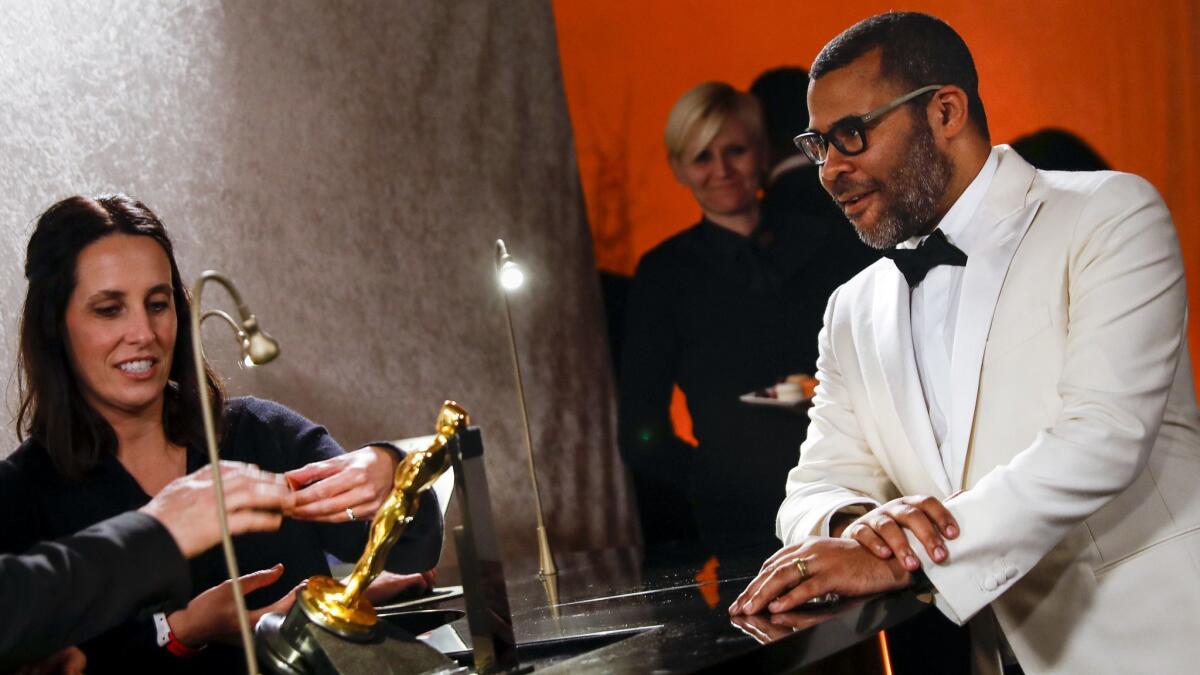Column: An Oscar is still an Oscar — even if the big moment isn’t televised

- Share via
Dear film community:
I understand many of you are upset by the film academy’s recent decision to have the Oscars for cinematography, film editing, hair and makeup, and live-action short film awarded during commercial breaks of the telecast.
Change is hard, even when it comes to trimming a three-plus-hour live television event that everyone complains about with such regularity that it was impossible to find two people who wanted to host it this year (the one who did, Kevin Hart, having been called out for a series of homophobic jokes). And the categories do appear to have been chosen at random — cinematography instead of, say, sound mixing, and why live-action short but not animated?
But here’s the thing. No one is saying there will not be an Oscar awarded in each of these categories, just that the “and the award goes to” won’t be part of the telecast. In each case, it will occur in front of the live audience, and the acceptance speeches will be edited into the telecast.
I’m not sure how that’s going to look either, but the film editors should.
READ MORE: Film industry slams academy decision to omit four categories from the Oscars telecast »
And whatever happened to “it’s an honor just to be nominated”?
Having the exact moment you win a big award appear on prime-time television is not a constitutionally guaranteed right. A lot of important awards ceremonies, including — just picking one out of a hat — the Pulitzers, are not televised at all and there is a reason for this: They are boring. Maybe not to those involved in the industry doing the awarding and certainly not to the winners. But to the wider audience that pays for things to be televised? Bor-ing.
I think we can all agree that the Nobels are at least as socially significant as the Oscars, and yet I don’t see Cartier and de la Renta lining up to decorate and dress all those physicists, economists and novelists (who frankly, need fashion advice way more than a bunch of filmmakers. “Who are you wearing?” “Nordstrom Rack.”)
The Oscars took place for 24 years without being televised; it wasn’t until 1953 that ceremony sponsors realized television was a good bet. (In what may or may not have been a coincidence, 1953 was also the year that the very forgettable “The Greatest Show on Earth” beat “High Noon” for best picture, one of Oscar’s greatest travesties.)
Now, of course, we can’t imagine a world without “Hollywood’s biggest night.” Except an increasing number of millions can. The show’s ratings, like all ratings including the Super Bowl’s, have steadily decreased, and while more people watch the telecast than just about anything else and ratings are not the only way to measure success in television these days, when it comes to expensive live television events, viewership matters.
Considering the tectonic upheavals in the television industry, and the constant criticism of the show itself, the Oscar telecast has remained relatively, some would stay stubbornly or arrogantly, unchanged. For a show celebrating the cream of the cinematic story-telling crop, it is often flat, awkward and filled with boring moments over which neither the academy nor the producers have much control.
No matter how often and sincerely they are begged to do so, winners often make little or no effort to deliver interesting acceptance speeches, relying instead on personal laundry lists of agents, publicists, studio executives and seemingly random first names.
Likewise, every show is inevitably pocked with badly timed banter and strange moments of silence, making it painfully obvious that at least some of the presenters were not available for/interested in actually attending rehearsals.
It’s a television show, people. The teleprompter can take you only so far.
So other steps to streamline the process are now being taken. There will be no official host this year, and four categories will be awarded during commercial breaks. Maybe it will work, maybe it won’t, though frankly I can’t imagine viewers complaining about there being too few categories.
Of course, cinematographers, editors, hair and makeup artists, and live-action short filmmakers are important, to the films they work on and the industry itself. They and their counterparts are also important to theater, television and music. But most of the other big awards shows — the Grammys, Emmys and Tonys — do not include all of the winners in the prime-time telecast; the Grammys and Emmys have separate ceremonies for creative arts, technical and other categories, and Tony winners in similar categories are awarded before the telecast.
An Oscar is an Oscar no matter when you win it. The winners in these four categories will still receive their statuettes, and give their acceptance speeches, in front of their peers at the same time, in the same place, as all the other winners.
As most of us nonfamous people know, it doesn’t have to happen on TV to be a very big deal.
More to Read
The biggest entertainment stories
Get our big stories about Hollywood, film, television, music, arts, culture and more right in your inbox as soon as they publish.
You may occasionally receive promotional content from the Los Angeles Times.











